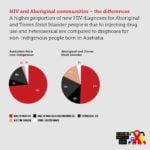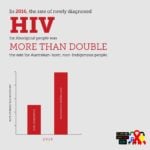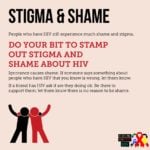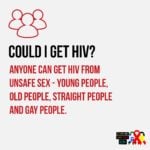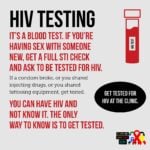About HIV | U & ME CAN STOP HIV | Testing for HIV | HIV Treatment | Living with HIV
About HIV
What is HIV?
“HIV” is short for “Human Immunodeficiency Virus”. It is a virus that affects the human body.
In Australia the most common way of getting HIV is having sex with someone who has HIV, and not using a condom.
- You can also get HIV by sharing injecting drug equipment – syringes or needles – with someone who has HIV, or by sharing tattoo or body piercing equipment.
- HIV can be transmitted from mother to baby during pregnancy, childbirth, or while breastfeeding.
- HIV can be transmitted if the blood from a person with HIV gets directly into an open cut on another person.
You can’t get HIV from ordinary day to day contact with people who have HIV. You can shake hands, share food and cutlery, use the same soap, sit on the same toilet – and give them a kiss and hug.
Our resources page has videos about HIV, as well as info-graphics and more: http://www.atsihiv.org.au/health-promotion/hiv-health-promotion-resources/
How do I tell if I have HIV?
HIV is most infectious in the few weeks after you get it. That’s why it’s so important to test regularly – especially if you haven’t always used a condom or you’ve shared injecting equipment.
People usually have some symptoms soon after getting HIV – within days or weeks. These seem like flu symptoms. They can then feel quite well for months or years before getting very sick.
The only way to tell is to get tested.
What is AIDS?
AIDS stands for “Acquired Immunodeficiency Syndrome” and is different to HIV.
Some people remember back to the 1980s and 90s when many people died from AIDS. This was because HIV treatment drugs were not effective back then and most people with HIV went on to get AIDS. Today, people with HIV in Australia generally no longer get AIDS because HIV treatment medication is very effective. HIV medication doesn’t cure HIV but if taken as directed people with HIV can live as long as people without HIV.
Without HIV medication, HIV causes more and more damage to a person’s immune system and they will develop AIDS.
What about other STIs
If you need any information on STIs such as chlamydia, gonorrhoea or syphilis visit the Young, Deadly, Free website at youngdeadlyfree.org.au and have a look at the factsheets.



